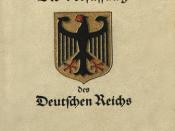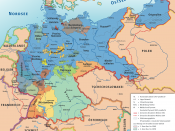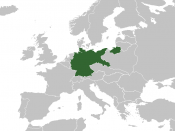Five years after the outbreak of World War One, Germany was on its knees; its armies on the Western Front were in full retreat, its citizens were starving and the Hohenzollern monarchy had abdicated in favour of a democracy. The German nation was about to enter into a period of political, social and economic chaos.
The incomplete revolution of 1918, resulted in a change in Germany's political system, from authoritarian to a democracy. Previously the government had power concentrated by the rule of the Kaiser so that when the new democratic system was introduced Germans had no understanding or experience of a democracy. Therefore, Germany's authoritarian tradition was still preferred by the people. However, it became apparent to the army's High Command that Germany was heading towards defeat. The army wanted to shift the blame for the defeat from the army by creating a democracy to negotiate the peace settlement.
As a result, the army would not be associated with the lost war, which is evident by Ludendorff's statement, "Let them now conclude the peace that had to be negotiated".
When the terms of the Treaty of Versailles became known, there was consternation in Germany. However, Germany was in no condition not to ratify the treaty and restart a war. Therefore, the new democracy was forced to become a signatory. However, at the conclusion of World War One, German troops were still occupying French and Belgium land, therefore the army created the idea that the arm was not defeated. This led to the belief in Germany that the army had been 'stabbed in the back', that they had not been defeated on the field but had been betrayed by the democracy and called the democracy the 'November Criminals'.
Although the political structure of German was altered by the revolution,


